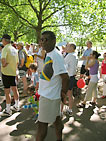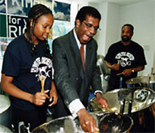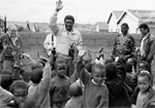|
Bill Morris has been involved in many charities over the years, all reflecting his broad interests and his life experiences. These are just some of those with which he has been involved. |
|
|
Breast Cancer Care and Macmillan Cancer Support
Bill Morris's wife, Minetta, died of breast cancer in 1990, and he supports charities such as Breast Cancer Care and Macmillan Cancer Support, two of the UK's leading providers of information, practical assistance and emotional support for anyone affected by breast cancer. "As someone with first-hand experience of the situation, I know the emotions that have to be faced. It affects your every-day life and your relationships; you cannot take in all the information that is being thrust at you. Personally, I now understand the importance of continuous communication with your partner." |

A sponsored run for
the Prostate Research Campaign. |
|
Chance to Shine Bill Morris helped to launch this national charity in 2010. It aims to give all children the opportunity to play, learn and develop through cricket, helping to develop the personal, social and physical skills of the 500,000 children they work with every year. " When I was growing up in Jamaica, I skipped lessons to play cricket. I was sure I was going to open the batting for the West Indies. Cricket has helped me to develop a sense of fair play - how to win and how to loose - and to learn the importance of being part of a team." |

Member of the TUC
cricket team. |
|
Family Action (formerly Family Welfare Association)
Family Action provides practical, emotional and financial support to those who are experiencing poverty, disadvantage and social isolation across the country. Today they work with over 60,000 families through 200 community-based services. Thousands more are supported with financial assistance through education and welfare grants programmes. |

Relaxation with some young steel drummers.
|
|
"The Family Welfare Association was set up in 1869, and since that time the charity has reached corners of need in this country which others ignore - they are never afraid of being brave and imaginative. "According to Department for Work and Pensions figures in 2023, there were 4.2 million children living in poverty in the UK in 2021 and 22. There is surely something wrong that charities are picking up the responsibilities of government." |
|
|
|
 Bill's birthplace in Bombay, Jamaica. |
|
"I am proud to have invested some time in basic schools education. We must invest in education because we cannot afford the cost of ignorance." |
|
|
The organisation provides support and advice to refugees and asylum seekers, as well as support for other refugee and asylum seeker organisations "Now more than ever Britain needs an asylum and immigration policy that has integrity, not one that is dictated by hostile headlines or driven by fears about security and terrorism. |
|
| "Whilst holding office as General Secretary of the T&G, I worked closely with the Refugee Council to end the government's voucher scheme. I believe that refugees, like other immigrants, make a huge contribution to the UK, and we should be giving them opportunities instead of denying them basic rights. | |
|
"Each general election turns into a bidding war between the political parties over who can be nastiest to asylum seekers. We need to keep working with the politicians to make them see how dangerous such policies are." |

Soweto, South Africa.
|
|
Terence Higgins Trust.
The Terence Higgins Trust was one of the first charities to be set up in response
to the HIV epidemic and has been at the forefront of the fight against HIV and AIDS.
Terence Higgins was one of the first people in the UK to die with AIDS. The Trust
was named after him, hoping to personalise and humanise AIDS in a very public way. |
|
|
Crisis
It was estimated that in a single night across England in 2022, 3,069 people were sleeping rough. Our eyes tell a worse story as we look around our streets today (autumn 2023). Crisis offers year-round education, employment, housing and well-being services from centres in London, Newcastle, Oxford, Edinburgh and Merseyside. "During the coronavirus epidemic we saw individuals, charities, government and industry work together to find temporary housing for thousands in the span of a few weeks. |

As Chancellor of the University of Technology, Jamaica, Bill Morris visited the Red Cross Centre outside Kingston, Jamaica a few days after the hurricane of 2004.
|
|
"But as lockdown eased, many people faced returning to the streets or to uncertain, unstable and sometimes dangerous living situations and others were pushed to the brink of homelessness for the first time. "If we can find solutions to homelessness in the middle of an epidemic, why can't we end homelessness in this, one of the richest countries in the world? Unless we do something now and enact long-term as well as short-term solutions, this progress will slip and risks being undone." |
|
|
The Alzheimer's Society
Dementia and Alzheimer's disease were the leading cause of death in Britain for the last 10 years - the biggest health and social challenge of our time. There are currently estimated to be 900,000 people in the UK with dementia, and this is projected to reach 1.6 million in 2040. The total cost of care for people with dementia in the UK is £34.7 billion, made up of healthcare costs to the NHS, social care costs of homecare and residential care as well as costs of unpaid care provided by family members and friends. The largest proportion of this is social care costs totalling £15.7 billion. "I doubt there are many of us who do not know someone with dementia. It is incurable, and it has a devastating effect on the individual, their family and friends. Yet apart from what help is provided by charities, very little support is provided for carers by government services, and if residential social care is required most is likely paid by those affected by dementia, not by the NHS or other government services. "There is also little unpaid support provided by government for the day-to-day care - even 24 hour care, and support provided by families and friends to those with dementia is costed by the Alzheimer's Society at the value of £13.9 billion a year. "It is (or should be) astonishing that so little support - to the person with dementia or their carers - is provided for this leading cause of death in Britain. Does any of this make sense in one of the largest economies in the world? "We must be grateful that the Alzheimer's Society, and other organisations, provide information, support and most importantly research into this horrible disease" |
|
|
The Stables Bill Morris was a regular visitor to The Stables at Wavendon which was converted in 1969 into a small theatre for lovers of jazz by the owners of the property - jazz musicians, Johnnie Dankworth (now deceased) and Dame Cleo Laine. 30 years later Bill joined in the fundraising campaign for redevelopment into a concert Hall - but he didn't quite come up to Johnnie's musical standards! Dame Cleo is on the left holding the appeal board alongside music students. |
 |

met in South Africa and the UK.

